 |
 |
 |
Covenants of God IllustratedThe covenants of God are understood in a variety of ways. One helpful way to look at them is by means of diagrams that can help us to visualize how they work. This page will show the diagrams in a logical order without a great deal of explanation. That is provided on other pages such as: God's Covenant - Old and New Compared What is Dispensationalism? Here, I am simply trying to illustrate how the covenants of God work mainly in terms of who is included in them. Let's consider the beginning of the covenants of God. There is a sense in which they began right in Eden (this will be covered on a coming page on the chronology of the covenants) but here we will start from the time of Abraham. The Covenants of God - Abraham One day God made a covenant with Abram (Abraham): "In the same day the LORD made a covenant with Abram, saying ..." (Gen 15:18) The day before God made the covenant there was no "Abrahamic" covenant. At that point, no one was included in it. I'll represent the people of the world by this rectangle - notice that there are no chosen people and no covenant. 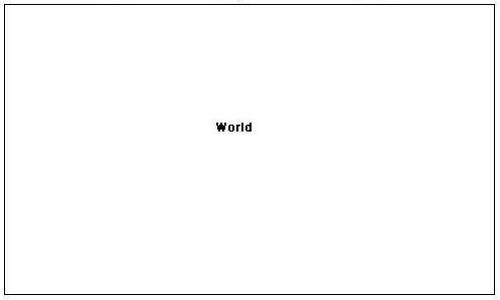 Once God made a covenant with Abram the situation looked like this: 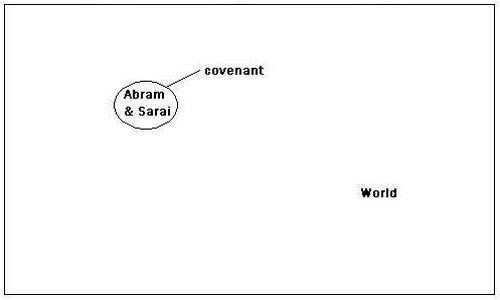 I will represent the covenant by a circle. Everyone inside the circle is included in the covenant. I have included Sarai because: "... she judged him faithful who had promised." (Heb 11:11) So, at this point, there are only two people within the covenant. Then a son was born to them. Ishmael was a son of Abraham and therefore of the seed of Abraham.
So, it seems that Ishmael should qualify on the basis of being of the seed of Abraham. 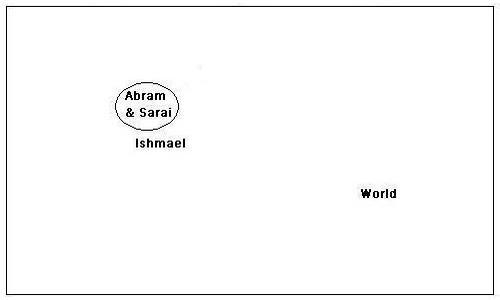 I have drawn the diagram excluding Ishmael from the covenant because: "Nevertheless what saith the scripture? [a reference to Genesis 21:10] Cast out the bondwoman and her son: for the son of the bondwoman shall not be heir with the son of the freewoman." (Gal 4:30) This points out that it may be more than simply being of the seed of Abraham that qualifies one to be part of the covenant. "And God said unto Abraham, Let it not be grievous in thy sight because of the lad, and because of thy bondwoman; in all that Sarah hath said unto thee, [including "Cast out this bondwoman and her son: for the son of this bondwoman shall not be heir with my son, even with Isaac." - v10] hearken unto her voice; for in Isaac shall thy seed be called." (Gen 21:12) Why was Ishmael not included as an heir? Why was he excluded from the covenant? - There must have been some element of his own choice in this. God instructed that His people should keep the terms of the covenant: "And God said unto Abraham, Thou shalt keep my covenant therefore, thou, and thy seed after thee in their generations." (Gen 17:9) In saying "Thou shalt keep my covenant" God was not saying that Abraham has been reprogrammed so that he can do nothing but keep the covenant. Rather, He is admonishing Abraham to keep it by making right choices. "By faith Abraham, when he was called to go out into a place which he should after receive for an inheritance, obeyed; and he went out, not knowing whither he went." (Heb 11:8) If people didn't keep the covenant by being obedient, they were released from it. The Covenants of God - The Son of Promise is Born Finally, 14 years after Ishmael was born, Isaac came along. "Now we, brethren, as Isaac was, are the children of promise." (Gal 4:28) 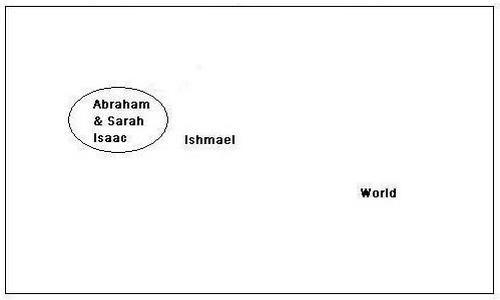 Now, we have one son who is within the covenant and one who is outside the covenant. Is that a problem? Not: "was that a problem?" - We are suffering the effects of that in our world today and will even more so in the near future. The Covenants of God - Jacob and Esau Now we move on to the next generation. Isaac and Rebekah had two sons of which Esau was born first. Esau, however, excluded himself from the covenant: 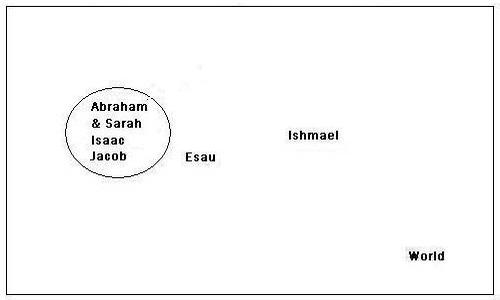 "Then Jacob gave Esau bread and pottage of lentiles; and he did eat and drink, and rose up, and went his way: thus Esau despised his birthright." (Gen 25:34) We reviewed the story of Jacob (Jacob Wrestles With God) where Jacob was illustrated as one who is truly included in the covenant because of his change of character and the relationship He had with God. He gained the new name of "Israel." The Covenants of God - Jacob's Twelve Sons Jacob had 12 sons who can be included in the covenant. 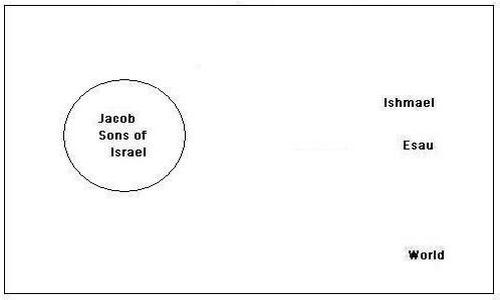 Abraham and Sarah have passed away. Jacob has moved with his children - the children of Israel - to Egypt during a famine. In Egypt, their number multiplied greatly and, eventually, they became slaves. They could now be referred to as the 12 tribes of Israel. 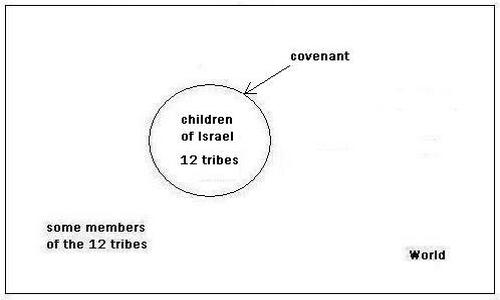 Can you imagine that, by this point, there may have been a few individuals who, by their own choices, excluded themselves from the covenant of God? The covenant involved promises on God's part and obedience on the part of the people. As far as the covenant is concerned, those who have excluded themselves are the same as anyone else that is "in the world." After they left Egypt, they soon came to Mt. Sinai where many people would understand that the covenants of God regarding the nation of Israel were instituted. The covenants of God are normally thought of to include the old covenant and the new covenant. The difference is spoken of in the book of Hebrews and will be discussed in a coming page on this website about the chronology of the covenants. (A link will be added here when done.) What is termed the old covenant was really just a temporary arrangement (as opposed to the new or everlasting covenant). A temporary arrangement based on the (faulty) promises of the people to be obedient to the law of God. For the purposes here of illustrating the covenants of God, the old covenant will be disregarded. We are concerned with the covenant that really works. The Covenants of God - A Nation is Born When Israel left Egypt many, even of the people of Egypt left with them. These were often referred to as the "mixed multitude." "And a mixed multitude went up also with them; and flocks, and herds, even very much cattle." (Exo 12:38) The Bible doesn't say for sure who was included in this group - it could have been dissatisfied Egyptians who wanted to leave for some reason or who desired to be included in the benefits promised to Israel. They may also have been people from other nations that had been captured and/or enslaved by the Egyptians (notice, they are not called "Egyptians"). The mixed multitude were often the first to complain and suggest a return to Egypt. People from this group (previously strangers to the covenants of God) who had faith would become a part of spiritual Israel. 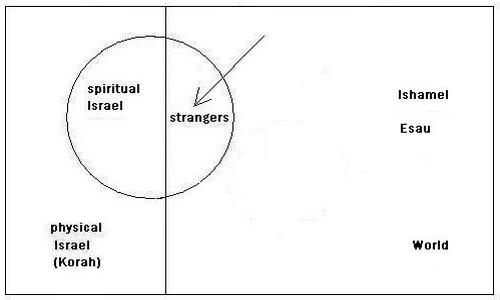 So, we have what could be referred to as spiritual Israel, those who (whether Israelite by descent or stranger) meet the requirements of and therefore were included in the covenant. We also have physical or literal Israel which includes spiritual Israel. Both that portion of physical Israel that is not included in the covenant and people of the world are outside of this covenant circle. Physical (but not spiritual) Israel would include such people as Korah etc "... the company of them that gathered themselves together against the LORD in the company of Korah; ..." (Num 27:3) Being "against the Lord," he was, by his own choice, excluding himself from the covenant. We also have examples of specific people who were originally outside of the covenant who were not descendents of Abraham, Isaac or Jacob and who were later came to be included within the covenant. Think of Ruth - "... thy people shall be my people, and thy God my God." (Ruth 1:16) The situation was much like this up until the coming of the Messiah. By then the Israelites are referred to as Jews and everyone non-Jew was referred to as a Gentile. Also, there had been a very high "wall" of prejudice erected by the Jews to exclude the Gentiles. The Covenants of God - The Christian Church is Formed As the Christian church began to grow, there were both Jewish Christians and Gentile Christians. It is abundantly clear, as we look at the verses, that these Gentiles were also included in the covenant. 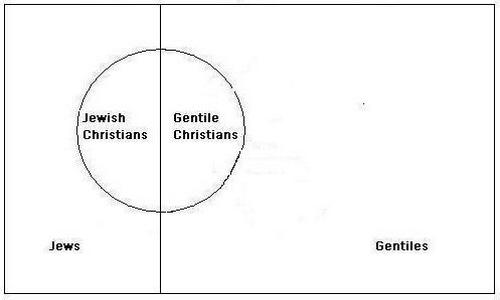 At first, those Christians of Jewish origin still had a certain amount of prejudice against the Gentiles Paul, speaking to the Ephesians, said that at one time they were: "... without Christ ... aliens from the commonwealth of Israel, and strangers from the covenants of promise, having no hope, and without God in the world:" (Eph 2:12) 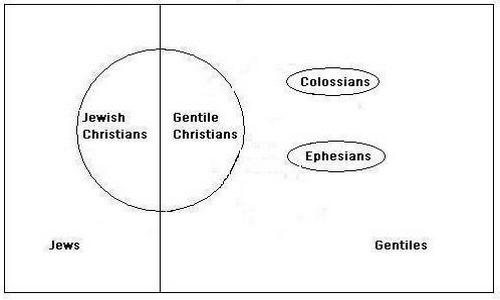 But a change happened to them. Some people from these various Gentile cities accepted the gospel and were included in the covenant. Now many people at about this point will be saying "wait a minute - I thought that when we are talking about the covenants of God (plural) that the old covenant was replaced by the new covenant." You will have to go to the additional pages referenced at the start of this page for more on that. I will just say here that God only ever intended to have one covenant that would serve the purpose of reuniting Him with His people from whom He had been separated because of sin. 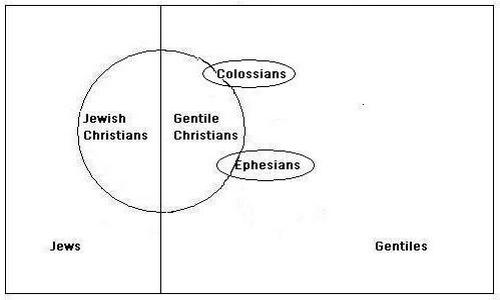 As these Gentiles responded to the gospel, Paul could then describe them as: "But now in Christ Jesus ye who sometimes were far off are made nigh by the blood of Christ." (Eph 2:13) Notice, there was a wall between Jewish and Gentile Christians. Where was this "wall"? Primarily it was in the minds of the Jews and was carried over to the Jewish Christians. It was a result of their belief that they had a favoured position with God above that of the Gentiles. The Covenants of God - The End of Separation The wall was broken down because, in God's eyes, there was no wall, no separation. 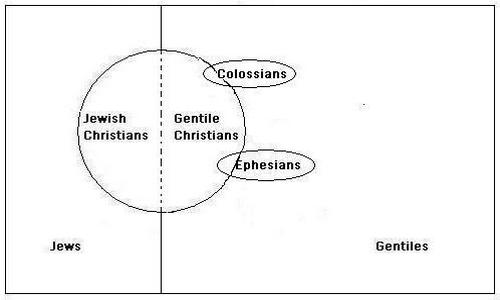 "For he is our peace, who hath made both (believing Jews and Gentiles) one, and hath broken down the middle wall of partition between us;" (Eph 2:14) A true understanding of the Gospel helped people to realize that "God is no respecter of persons." (Acts 10:34) In God's eyes it looks more like this: 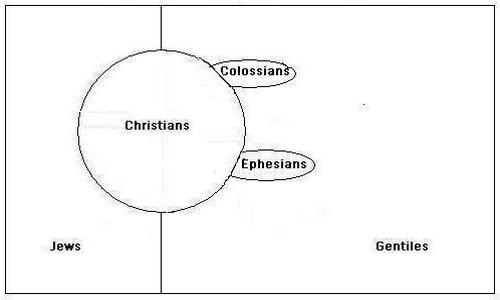 As far as the Jews are concerned, this diagram can be summarized by Romans 9:6 "Not as though the word of God hath taken none effect. For they are not all Israel, which are of Israel:" (Rom 9:6, KJV) To understand this verse, there has to be a word or two added. Let's illustrate: "They are not all Canadians which are Canadians." This is clarified in a number of versions of this verse: "But it is not as though the word of God has failed. For not all who are descended from Israel belong to Israel," (ESV) Ultimately, in God's eyes, I think the picture looks like this: 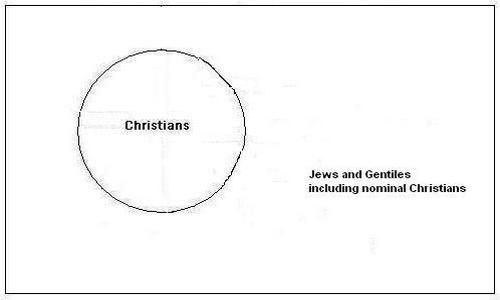 We could say that the wall of partition or the distinction between physical Jews and Gentiles is gone (in God's eyes). Also, that this group outside of the covenant relationship with God includes most of the people that call themselves Christians. The people inside the circle are those who have partaken of the covenants of God.
They are His people and He is their God. That is what the covenants of God are all about. |
Prophecy Newsletter
Receive
free newsletters
reporting and analysing world events related to prophecy.
The Greek has multiple words for forgiveness? God forgives (charizomai) whether we ask or not. Receiving forgiveness (apheimi) is by our choice.
God always forgives!
|
|
|
|
||
|
| ||

New! Comments
Have your say about what you just read! Please leave a comment below.